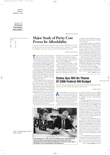Cognitive therapy, an evidence-based form of psychotherapy, has become widely used in the past 40 years. It is defined by Robert Hales, M.D., et al. in the Textbook of Psychiatry, Third Edition, as a “system of psychotherapy based on the theories of pathological information processing in mental disorders. Treatment is directed at modifying distorted or maladaptive cognitions and related behavioral dysfunction.” As proposed by Aaron Beck, M.D., it is an interactive relationship between environment, cognition, emotion, and behavior.
This form of psychotherapy had antecedents under other names.
By the end of the 19th century, psychiatrists and neurologists believed that the brain was the seat of the mind, and some proposed that mental states could affect physical function. In 1876, at a meeting of the American Neurological Association (ANA), G. M. Beard, M.D., read a paper on the influence of the mind on the cause and cure of disease. He stated, “The effects [of medical therapeutics] brought about through the emotions... in a systematic way were as permanent as through... medicine.” Beard's colleagues did not accept his views.
That same year, the American Journal of Insanity (AJI) published a paper by J. Tobey, M.D., that discussed the influence of the physician to“ excite the mental state which acts beneficially on the body.”
In 1901 Richard Dewey, M.D., published a paper in the AJI titled“ Mental Therapeutics in Nervous and Mental Diseases.” He wrote,“ The so-called functional nervous diseases are strikingly affected by mental influences.... Often a long course of training and practice in substituting safe expectations for fear and apprehension [is needed].... [T]he cure consists of a process of rebuilding in the patient healthful lines of thought and association and of forming new habits of thought and action by a process [like] education.” Dewey's colleagues supported his views.
The following year, the AJI published a paper by a clergyman who had studied medicine. In that paper, titled “The Possible Influence of Rational Conversation on the Insane,” he espoused similar ideas. The author quoted John Harvey Kellogg, M.D., of Battle Creek, Mich., as using the term “psychotherapy” for an approach similar to the one proffered by Dewey.
At the ANA meeting in 1908, Adolf Meyer, M.D., noted that proper mental activity, conduct, and attitudes to train the individual to meet certain difficulties are the aim and essence of psychotherapy. Meyer was a professor of psychiatry and director of the Henry Phipps Psychiatric Clinic at Johns Hopkins Medical School from 1910 to 1941.
These ideas were further developed by John Whitehorn, M.D., who followed Meyer at Johns Hopkins (1941-1960). He noted that the way he talked with patients differed from that of other psychiatrists. Basic to his approach was the premise that individuals react to other people and situations in a learned manner that depends on the “attitudes and sentiments” by which they establish relationships and negotiate in interpersonal transactions. He advocated a therapy promoting learning that builds a patient's expectations about his or her ability to deal with anxiety-provoking situations. The therapist guides the patient in a collaborative process to correct misperceptions, assume more realistic attitudes, and seek solutions to deal with disturbing people and situations. ▪
